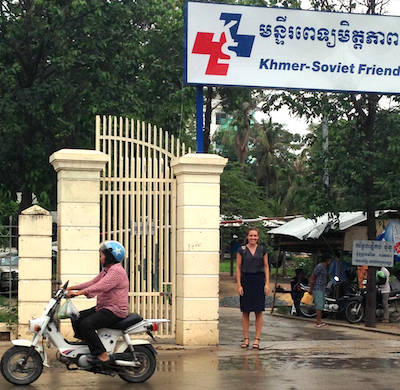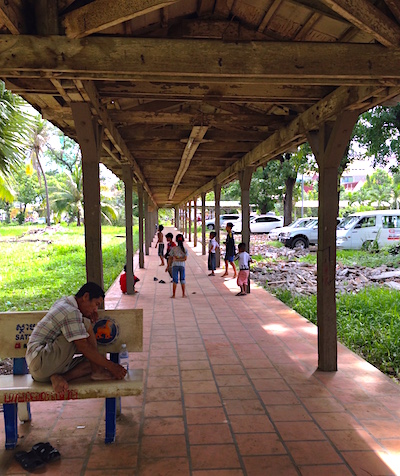In Cambodia, Seeking Causes of Kidney Failure.

In Cambodia, acute kidney injury (AKI) can seem like a low priority compared to other preventable health issues, says MPH student Haley Tupper. “When you look in the charts, every fourth person is, ‘Head trauma; road accident,’ ‘head trauma; road accident’.”
AKI prevention is vital instead because Cambodia’s healthcare system is many years away from being equipped to treat it, says Tupper, who is studying AKI at two hospitals in Phnom Penh thanks to the Santander Universities Scholarship Program.
“One, it’s quite fatal whether you’re in the US or in Cambodia,” she says of the condition, in which kidneys stop functioning. “Two, it can lead to chronic kidney disease, and if you have end-stage renal disease in Cambodia, for most people it’s a death sentence, and it’s the worst kind of death sentence.”
Only a handful of hospitals in the country are able to perform dialysis—the process of removing waste and excess water from blood because the kidneys are not functioning—and those that do are unable to provide it affordably.
“Many patients do not understand that dialysis doesn’t cure the condition, so they will spend the $50 to $70, plus $30 for the disposable supplies needed to do dialysis, which can be a huge amount for the family,”Tupper says. Because a patient needs dialysis multiple times a week, those costs can ruin a family—and, when the money runs out, the patient dies.
To date, there are no published data describing the burden, causes, or health impact of AKI in Cambodia, nor for the vast majority of developing countries.
To address that gap, Tupper is sifting through medical records of patients treated at two hospitals in Phnom Penh, Calmette Hospital, and Khmer-Soviet Friendship Hospital. Professor of Global Health Donald Thea is Tupper’s advisor on the study, while the primary investigators in the US and Cambodia are nephrologists Bernadette Thomas at the University of Washington and Niv Rathvirak at Calmette Hospital, respectively.

From ethics approval for the study at both hospitals, to accessing the records themselves and working alongside doctors and staff, Tupper says the practicum also provides a tremendous opportunity to learn about the country’s healthcare system. That includes dependence on foreign governments and organizations, for better or worse.
Calmette is one of the premier hospitals in the country (“last week the king came,” Tupper says), and the only public hospital with a dialysis unit. It is closely tied to France, which controlled Cambodia until 1953 and continues to help support the hospital.
The massive but severely underfunded Khmer-Soviet Friendship Hospital, as its name suggests, was supported by the Soviet Union. “It’s a bit like a ghost hospital,” Tupper says now. “There’s no dialysis at Khmer-Soviet.” Even at Calmette, she says, whole programs can disappear when donors and foreign governments turn their attention elsewhere.
Tupper, who will begin medical school this fall and hopes to practice nephrology abroad, says taking a deep dive into the two hospitals has been an invaluable learning experience. “I get to see things I learned about in my health systems class in real life,” she says.
“I’m in a much better position to organize and do a quality study in another country at a similar level of development, which is huge.”
—Michelle Samuels
Haley Tupper is taking over the SPH Instagram account from Phnom Penh, Cambodia, July 5 through 8. Follow along at Instagram.com/BUSPH/.
Comments & Discussion
Boston University moderates comments to facilitate an informed, substantive, civil conversation. Abusive, profane, self-promotional, misleading, incoherent or off-topic comments will be rejected. Moderators are staffed during regular business hours (EST) and can only accept comments written in English. Statistics or facts must include a citation or a link to the citation.